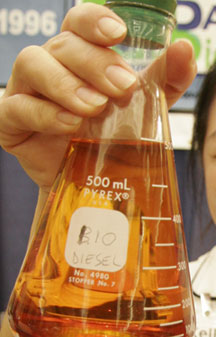Without homegrown crops, biodiesel still will be imported fuel
THE ISSUE
A Seattle-based company is considering a biodiesel plant in West Oahu.
|
THE quest to reduce imports and use of fossil fuels in the islands appears to be trending toward biodiesel production with two plant proposals
on the drawing board.
Though biodiesel could be developed as a strong alternative, if the raw materials from which the fuel is derived cannot be grown here, Hawaii still would remain largely reliant on outside sources for energy production.
That said, using biodiesel still would be better and cleaner for the islands than continuing our current dependence on oil and coal for electricity and fuels to power vehicles and machinery. But it should be just one component in a multipronged strategy to transform Hawaii's energy portfolio.
The Star-Bulletin's Diana Leone reports that a Seattle-based company is the latest enterprise considering the state for a biodiesel plant. Imperium Renewables Inc. has told a West Oahu neighborhood board that it plans to build a $90 million facility on state land in the Kalaeloa area to generate 100 million gallons of biodiesel annually. That's an ambitious yield considering Imperium's only plant currently in operation produces only 5 million gallons a year.
 STAR-BULLETIN / 2006
An employee of Pacific Biodiesel in Maui displays a becker of biodiesel fuel processed from cooking oil.
|
|
Meanwhile, the company that provides most of the electricity in Hawaii also plans to get into biodiesel production with a plant on Maui, but it wants the state government to help out. Maui Electric Co., an affiliate of Hawaiian Electric, and its new subsidiary, BlueEarth Maui Biodiesel LLC, is asking the lawmakers to back its venture with special purpose revenue bonds.
A bill to authorize the assistance is advancing through the Legislature, but is opposed on a number of points. Among them are whether the bonds, though they do not encumber the state financially, nonetheless give BlueEarth Maui an unfair advantage in the marketplace. There also is the question of the advisability of extending the electric company's dominance in power production through its control of a fuel source.
Moreover, there already are worldwide concerns about the environmental tolls of growing the crops used for biodiesel, particularly palm oil, the demand for which has resulted in destruction of rain forests and other acreage.
For Hawaii, the best practice would be to use homegrown fuel crops. But even if all available agriculture land not already in food or other production were to be planted with feedstock, yields would not support the proposed facilities. If self-reliance in energy production is the goal, biodiesel is promising, but Hawaii must develop a diversity of renewable sources, as well.


Oahu Publications, Inc. publishes
the Honolulu Star-Bulletin, MidWeek
and military newspapers
BOARD OF DIRECTORS
 David Black, Dan Case, Dennis Francis,
David Black, Dan Case, Dennis Francis,
Larry Johnson, Duane Kurisu, Warren Luke,
Colbert Matsumoto, Jeffrey Watanabe, Michael Wo
 HONOLULU STAR-BULLETIN
HONOLULU STAR-BULLETIN
 Mary Poole,
Mary Poole, Editorial Page Editor
(808) 529-4748;
mpoole@starbulletin.com
The Honolulu Star-Bulletin (USPS 249460) is published daily by Oahu Publications at 500 Ala Moana Blvd., Suite 7-500, Honolulu, Hawaii 96813. Periodicals postage paid at Honolulu, Hawaii. Postmaster: Send address changes to Star-Bulletin, P.O. Box 3080, Honolulu, Hawaii 96802.

